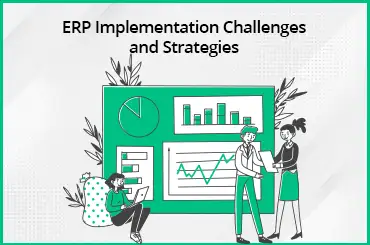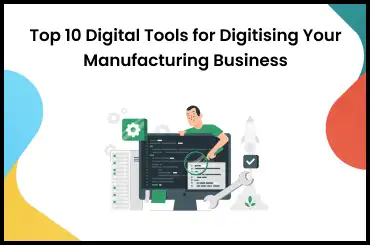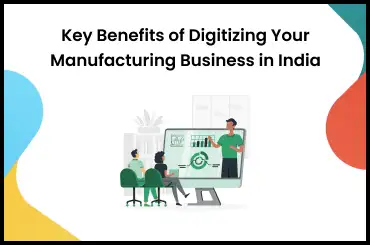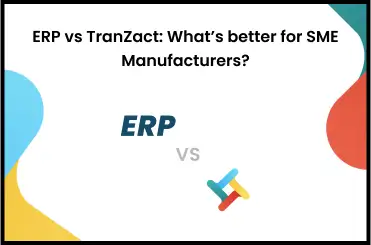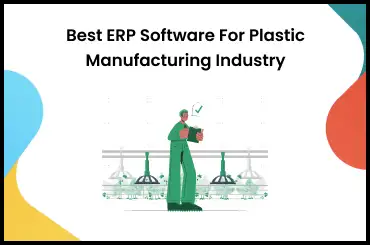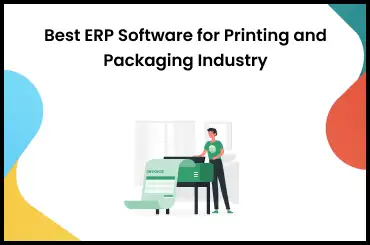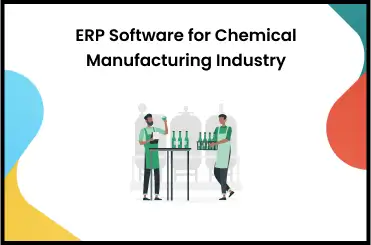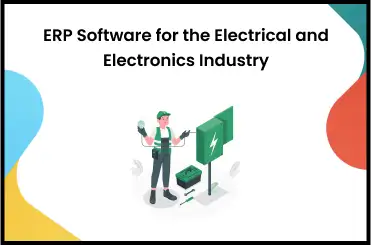ERP software selection criteria must be carefully assessed as an ERP is essential to the success of any firm today. With numerous options available in the market, it's essential to have a clear understanding of the selection criteria that will guide your decision.
It's important to keep in mind how your business's objectives and needs may affect certain features. We have listed out the key factors to think about while evaluating the Enterprise resource planning (ERP) software selection criteria for your business.
Evaluate Your Business Needs
How will your ERP system be used? The question may appear simple, but it really calls for some serious consideration. In such a situation, having a dedicated internal team comprised of stakeholders from all parts of the organization might prove quite useful.
Each team member must initially solicit input from their own group on the new system's intended function and features. Then, the internal team can compile all of the responses into a business requirements analysis document. This document details the system's expected return on investment (ROI) for each relevant department and the metrics that will be used to gauge success.
In the following section, we have provided a guide to help determine the essential ERP software selection criteria for your business.
Top 8 ERP Selection Criteria
ERP functionality must be flexible enough to meet the needs of a wide variety of businesses and departments. The following are the important criteria to consider as part of the ERP selection criteria matrix.
1. Total investment and return on investment
Which ERP deployment model you use determines the total investment and returns. Implementation, customization, updates as needed, and security measures are all additional expenses that must be covered by the company when ERP is deployed on-premises. Employee training and continuing assistance also incur additional expenses. There are upfront expenditures and continuing expenses; the latter might vary with the volume of service provided. Realizing the return on investment (ROI) for ERP sometimes takes longer than for less mission-critical systems due to the high total cost of ownership (TCO).
One reason why cloud deployment methods are so well-liked by expanding businesses is that cloud-based ERP, which is set up, hosted, and maintained by a cloud provider, cuts, eliminates, or amortizes many of those expenses. This potentially cuts down TCO and almost definitely speeds up ROI.
This is because cloud ERP is hosted and accessed over the internet; the cloud provider handles security. The program is regularly updated, upgraded, and maintained by the vendor.
2. Integration of Systems
A good enterprise resource planning system will do more than just unify your business operations; it will also integrate smoothly with your other software applications. And if they do, the new vendor should provide connections that synchronize across systems, ideally in real-time, so that data is always updated.
3. Assistance and education
In order to set up the ERP system, you will need assistance, regular maintenance, and training of staff. Find out whether the vendor offers all of the aforementioned implementation help. Check if it has expertise in your industry, it offers tiered support options that can scale with your business's demands along with guaranteeing a certain response time. In certain cases, paying a monthly subscription for managed assistance is a possibility.
4. Implementation
Depending on whether the ERP system is put on-premises, in the cloud, or in a hybrid mix, the deployment timeline might range from one month to more than a year. Since the vendor handles setup rather than tying up internal resources, a cloud-based ERP system often allows businesses to be up and operating the quickest.
Data migration is an inevitable part of implementing a new ERP, and it must be preceded by thorough data cleansing to guarantee accurate results. It is crucial to do thorough testing prior to going live.
5. Competence in certain markets offered by vendors:
It is recommended to assess the ERP providers' industry knowledge of the ERP software itself. The best ERP provider will have a track record of successful implementations for businesses in your sector and of comparable size to your own. References from happy (and maybe unhappy) customers should be requested and checked.
6. Technology
New technologies are improving many of the perks that an ERP system offers. Improvements in corporate operations, more accurate and predictive analysis and insights, and the ability to tailor user experiences are just some of the many advantages offered by cloud computing, artificial intelligence (AI), and machine learning (ML).
Augmented reality, transactional blockchain technology, and Internet of Things (IoT) devices like sensors and cameras that feed information back to the ERP are all features that may be supported by some systems.
7. Product Road Map for the Vendor
The original needs of a company for an enterprise resource planning (ERP) system are rarely all that the company ends up wanting or needing. Therefore, it is essential to inquire about the vendor's plans for the future development, enhancement, and maintenance of its product (including new versions, features, and functions). Additionally, how these elements will be incorporated into the currently running application, and how often fixes and upgrades are released is another factor to think about.
8. Customization
Whether or not you require customization at the time of ERP selection will depend on the complexity of your business operations, and it may become increasingly critical as your company expands. It might also influence the decision between a single-tenant and multi-tenant cloud deployment. In the former approach, the ERP is used only by one firm, but in the latter type, it is used by several businesses.
ERP Software Selection Process
Assessment of the right criteria for selecting ERP software from an ERP vendor is a long-term investment that affects every part of your company. While the specifics of what constitutes a "critical requirement" will vary from company to company, you should check that your ERP system:
- Fulfills all of your company's functional needs.
- Whether or not your ERP vendor has worked with businesses like yours before.
- What kind of ERP user assistance do you require?
- Just how much does your enterprise resource planning system set you back? Your organization's budget must accommodate an ERP.
- You need a system that works throughout your whole organization as opposed to many separate systems, so think about how they will interact with your new system.
- What changes do you require to the standard software?
- Keep in mind your unique business challenges as you go through our ERP selection criteria list and the answers provided here.
Bonus: ERP Software Selection Checklist
Here are some more factors to think about when selecting a manufacturing ERP system in the modern, digital environment, in addition to those already stated.
Seek out an up-to-date ERP system
Technology advancements are essential in the industrial sector. The ERP software used in modern factories may be expanded as the company expands. To foster expansion and adaptability in the digital economy, it employs cutting-edge technologies including AI, ML, advanced analytics (AA), and the Internet of Things (IoT).
And it provides features that are tailored to the specific requirements of your company and field. Growth, efficiency, productivity, and cost savings may all be unlocked by implementing a cutting-edge enterprise resource planning (ERP) system in the manufacturing sector.
Find an ERP provider with extensive expertise in your sector
The ERP partner you choose should be available to assist and advise you throughout the whole process, from initial evaluation and shortlisting to installation, system integration, go-live, and continued customer support. They need to provide not just practicality, but also competence and understanding in their respective fields.
Get an ERP system that fits your needs
Your ERP ultimate decision should be made with your company's size and kind in mind. In the manufacturing industry, whether your company is large or small, you need a system that can adapt to your changing demands. But don't let yourself get talked into a system that's too big. Choose a platform that facilitates widespread adoption by offering intuitive interfaces, dashboards, and a straightforward design.
Consider a cloud-based ERP system
Customers have been more demanding in recent years, asking for things like quicker shipping, more reliability, more individualized offerings, and cheaper prices. Managers may manage, monitor, and assign work without physically being on the shop floor owing to cloud ERP's ability to track orders, materials, machine availability, and capacity via handheld devices. A cloud ERP allows you to safely generate, modify, and analyze real-time data on cash flow, inventory availability and costs, and pricing strategies. The cloud is quickly becoming the platform of choice for many companies.
Establish a Spending Plan and Timeline
ERP companies focus on making a profit. They aren't as concerned with preparing you financially and temporally. Expectations can be more accurately set by comparing your work to those of similar projects. An impartial ERP expert with previous ERP negotiating experience can also help set reasonable expectations. It might be challenging to find a good ERP consultant for ERP discussions. Find one that will assist you in formulating a negotiating strategy by inquiring as to which aspects of the contract are most crucial. Next, they'll compile a negotiation guide that includes like-for-like evaluations of each platform. The consultant will also calculate the whole life cost of ownership, taking into account things like resource costs and licensing agreements.
Try TranZact's ERP Solutions
An enterprise-wide resource planning system is useful in every department. Because of this, making the best choice involves serious consideration and analysis. The features, prices, and deployment structures of ERP software can vary widely. With well-defined objectives and appropriate assessment criteria in place from the outset, a company can pick and implement an optimal erp system selection criteria that will provide a substantial return on investment (ROI) over the long term. TranZact is designed specifically for the manufacturing industry with solutions such as inventory management, production, and material planning. It is a cloud ERP and also offers a free trial before you select any of the paid plans.
FAQs on ERP Software Selection Criteria
1. How do you decide which ERP vendor to work with?
ERP providers may be judged on a wide range of characteristics. Find out not just how proficient they are with ERP but also how well they comprehend the specifics of your sector by asking the right questions. Inquire about costs, time frames for deployment and training, ongoing and new user support, system updates, and future product plans. Further, inquire about previous clients as references.
2. What should come first when looking for an ERP provider?
The first stage is to form an internal team of stakeholders from various parts of the organization. Then, create a business requirements analysis document outlining the specific business objectives and ERP requirements of their respective departments. The accounting, sales, procurement, and marketing departments' chiefs, as well as members of IT, are typical members of this review team.
3. How do organizations choose an ERP provider and system?
Systematic and rigorous evaluation of ERP systems is required. If a company finds a system that seems like it would work for them, they should go to the vendor, ask for a demo, and check references.
4. What is the ERP selection process?
Choosing an enterprise resource planning (ERP) solution requires a multi-stage process. There are several things to consider when choosing a new system, including the following: cost, deployment methodology, implementation time, support and training, vendor knowledge, and customization options.
5. Where can I get ERP specifications?
You can obtain ERP specifications from various sources such as ERP vendors' websites, product documentation provided by ERP software providers, industry research reports, and consulting firms specializing in ERP solutions.
6. What is meant by implementation in ERP?
ERP implementation describes the steps used to set up an enterprise resource planning (ERP) system. The process involves bringing together disparate company processes including sales, inventory, production, HR, payroll, and accounting into a unified platform.







